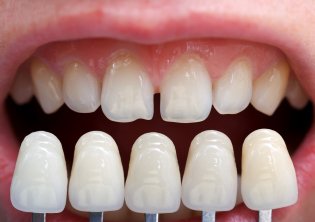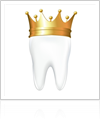 A Patient’s Guide to Porcelain Dental Veneers
A Patient’s Guide to Porcelain Dental Veneers
Thanks to advancements in tooth restoration technology, dental porcelain can be sculpted to closely replicate the look and feel of natural tooth enamel, while providing the strength and resilience of natural tooth enamel. Porcelain veneers are ideal for individuals looking to make slight position alterations, or those who wish to change the shape, size, and/or color of their teeth. And while porcelain dental veneers are technically considered a cosmetic treatment, they can also make it easier and more comfortable to chew food. If you are considering veneers, this guide will tell you what you need to know.
Bonding Veneers to Teeth
The bond is the most important aspect of a veneer. To apply a veneer, your dentist will remove a very small amount of the original tooth, usually less than a millimeter. This not only creates room for the veneer to fit within the mouth but also ensures accurate tooth function and placement. Light-sensitive resin is placed between the original tooth and the veneer and hardened using a special curing light.
Caring for Porcelain Veneers
The good news about porcelain veneers is that they are quite simple to maintain—you simply treat them as you would your original teeth, with routine brushing, flossing, and visits to your St. Louis dentist. Your dentist may recommend non-abrasive fluoride toothpaste to keep your porcelain veneers looking like new. And if you have a habit of grinding or clenching your teeth at night, your dentist may fit you with a nighttime bite guard to avoid damaging your veneers .
Pros and Cons of Porcelain Veneers
There are alternatives to porcelain veneers, so it helps to know the pros and cons before you have them applied. One major benefit of porcelain veneers is that they look and feel identical to natural teeth. Custom-made veneers also resist coffee and tea stains and cigarette smoke. On the downside, a veneer is not considered a reversible treatment, as a portion of the original tooth must be reduced prior to application. Porcelain veneers are also brittle and should not be used to chew on ice, bite fingernails, or open bottles with.


